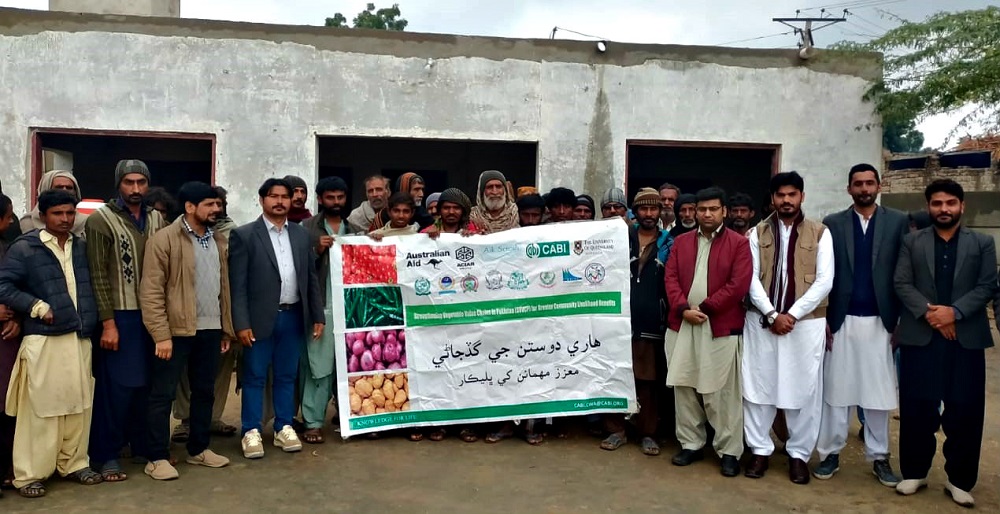
Pakistan is the fifth largest onion producer with a total area of around 131.4 thousand hectares and annual production of 1.8 million tons. Most of the onion farmers are smallholders and face challenges such as smaller volumes and fluctuating prices due to a production-led approach.
In order to improve smallholder onion farmers’ profit, the Strengthening Vegetable Value Chains in Pakistan (SVVCP) project takes the value chain approach to study the issues and barriers in the onion supply chain in Pakistan through the lens of customers’ preference.
It has been identified that the onion poor quality and lower shelf life are the main issues. Five interventions have been designed and introduced to smallholder onion farmers to mitigate these issues associated with quality and shelf life.
Five interventions
These include raising own uniform healthy onion nursery; stopping irrigation 20 days before harvest; curing onion bulbs in the field for two weeks; proper cutting, sorting and grading; and best marketing practices (direct marketing).
These interventions were rigorously tested at pilot scale for three consecutive seasons (2019-22) to see how they could benefit the farmers.
They sought to do this through improving the quality of farmers according to their buyers’ needs and consequently enhance the livelihood of smallholder farmers along with long-term market linkages on a sustainable basis.
Scaling out of successful interventions needs to be designed to reach a large number of farmers to get benefits from the tested interventions.
Value chain approach
Agriculture Extension Sindh plays a vital role in providing agro-advisory services and dissemination of the latest information mainly associated with crop production to the smallholder farmers based in the Sindh.

The SVVCP team will scale out the value chain approach among the smallholder farmers including vegetable growers together with Agriculture Extension Sindh.
This value chain training was designed to build the capacity of agricultural extension officers in Sindh so that they can help to scale out the value chain approach and best practice interventions in the onion value chain.
The Director General Extension Sindh nominated ten extension staff, including six men and four women, on the request of the SVVCP CABI team.
Training elements
The training comprised of lectures, interactive sessions, market research through a ‘walk the chain’ approach with the opportunity of interaction with farmers, wholesalers and retailers.
The aim was to learn the prevailing market needs, how each value chain actor is working to deliver those needs, challenges, and how SVVCP onion farmers create consumers’ value in the existing value chains.
The CABI team familiarized the participants with the basic concepts of the value chain approach to understand the objectives of the SVVCP project and the approaches it is employing to achieve various objectives.
These objectives include what the value chain approach is, the importance of the 4Ps of marketing principles (to understand the working of value chain approach), problems associated with the existing vegetable marketing system and how value chain thinking and approach help smallholder farmers overcome marketing related issues and earn higher profits.
The objectives also include how gender-friendly interventions can be designed to empower rural women in the social context of Sindh.
The sessions were interactive and participants were actively engaged throughout the training. Participants showed keen interest in the subject matter due to its uniqueness for them.

Value chain development
Onion value chain development was presented to participants as a case study to achieve improved smallholder livelihood through the value chain approach. A preparatory session was also organized to familiarize the participants with the ‘walk the chain’ activity as a market research tool.
The participants conducted the ‘walk the chain’ exercise under the supervision of the CABI SVVCP team at Khawaja Stop and Tando Allahyar wholesale markets. Here they interviewed commission agents, wholesalers, retailers and consumers at Khawaja Stop Market.
Participants identified what the expectations of the customers from the traders/market actors are and what traders are doing on daily basis to meet those expectations.
They also sought to seek what the issues and challenges are to meet these requirements as well as where the opportunities are for the farmers in the existing value chain and why onion farmers adopted SVVCP interventions.
Field day
The workshop participants also attended a farmers’ field day at onion village and met the non-SVVCP farmers / SVVCP farmers group leader and member farmers. Here they learned about their production and marketing practices and associated problems.
They also learnt about interventions they adopted through the SVVCP project including market research; benefits they received in terms of bulb quality improvement, reduced field losses, increased customer’s satisfaction and trust on a long-term basis. They also understood more about higher profits they earned by following these approaches.
At the end of the training, feedback from participants was recorded.
The training achieved its objectives as per collected feedback in terms of sensitization of Agriculture Extension Sindh staff with the value chain approach, the importance of market information in decision-making related to farming, and the basics of market research methodology.
Additional information
Main image: Extension workers from Agriculture Extension Sindh meet to learn new skills in helping onion farmers in Pakistan grow more profitable crops (Credit: CABI).
Blog authors
Dr Habat Ullah Asad and Mr Azeem Hayder
Project page
Find out more about how CABI is helping smallholder farmers in Pakistan improve their livelihoods through the ‘Strengthening Vegetable Value Chains in Pakistan’ project from the dedicated project page here.
Related News & Blogs
Sindh farmer gains global recognition for sustainable cotton farming innovations
Photo credit: Evronas/Better Cotton. Location: Better Cotton Conference, Istanbul, Türkiye, 2024. Sindh farmer Fateh Muhammad Laghari has gained recognition for his commitment to sustainable cotton farming practices as part of the Better Cotton Member…
5 December 2024




